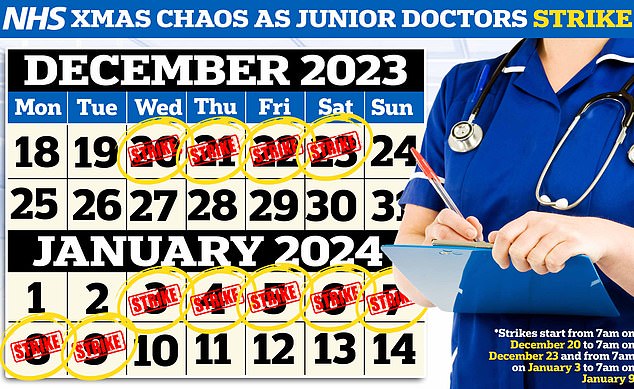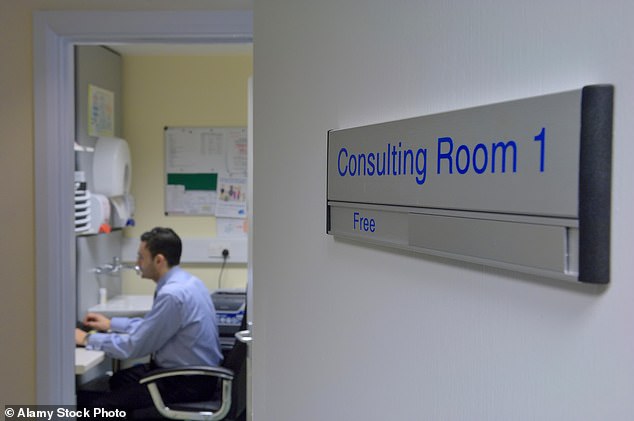Millions are waiting more than a month to see their GP with many patients heading to overstretched A&E departments or giving up entirely as delays hit record levels, new figures show
Millions of Britons are waiting more than a month to see their GP, with many patients heading to A&E or giving up altogether as delays reach record levels, new figures show.
About 14.9 million appointments took place more than 28 days after they were booked in the first ten months of this year, research from The times found it.
The grim figure is already significantly higher than last year's 12.8 million people waiting and is on track to surpass the previous record of 15.2 million in 2019.
In October, some 2.6 million appointments were reported more than 28 days after booking, which amounts to one in 13. The figure is almost a million more than in the same month before the pandemic, while it is 700,000 more than in October 2022 .
There were also 28,000 excess deaths between January and June this year, with the biggest increase seen in adults aged 50 to 64. Many died from preventable conditions, including diabetes and heart disease.
Private health insurers are also reporting increasing demand for GP appointments. Vitality said as many as 40 percent of claims are related to private healthcare consultations, up from 4 percent in 2015.
Rishi Sunak has promised to cut NHS waiting lists, but millions of Britons are left waiting for months to see their GP
Spire Healthcare said its network of private GPs had booked 41 per cent more appointments than last year.
Experts have attributed the GP appointment crisis to a growing population and a shrinking workforce.
Many GPs are choosing to retire at 50, move abroad or work in the private sector due to complaints about rising demand, paperwork and a toxic environment.
The latest doctors' strike, which saw disgruntled workers walk out for a total of nine days in the run-up to Christmas and into January, will also impact NHS waiting lists, Prime Minister Rishi Sunak has said.
He has urged medics, who earn up to £60,000, to 'do the right thing' and call off industrial action, which will rock hospitals at what is usually the busiest time of year.
The NHS waiting list stands at 7.7 million, with hundreds of thousands of patients stuck in the system for more than a year. However, the figure for October is 65,000 lower than last month, a sign that waiting lists are slowly but surely shrinking.
The IPPR think tank found this year that around one in eight who failed to get a GP appointment resorted to A&E instead, an increase from around one in 13 two years ago.
Steve Brine, the Tory chairman of the Commons Health Select Committee, said it has been 'worrying for some time' that young people are choosing private subscription services online in favor of NHS general medicine.
He asked whether anything could be done to lure them back to the standard system.

Junior doctors in England have voted for new strikes in December and January after talks between the government and the British Medical Association collapsed
The Times discovered that Ronald Leslie Harris, from Hereford, killed himself in June after waiting weeks to see a GP for mental health problems.
Meanwhile, Kaine Carlon, 34, was found dead at home in January. He had undiagnosed type 1 diabetes and could not make an appointment with the doctor, his roommate revealed.
While most of October's 34.2 million patients were seen within a week, 4.8 million patients had to wait between 15 and 28 days.
Louise Ansari, national director of Healthwatch England, said getting GP appointments was the main reason why patients approached the watchdog.
She said challenges with long phone queues or online tools led to some patients “refraining from trying to book appointments at all”.
Data from NHS England shows that the waiting list fell by 0.8 percent in October.
However, the toll of 7.71 million is still one of the highest figures since NHS recording began in August 2007 and up from 490,000 in October 2022.
By comparison, around 4.4 million people were stuck in the system when the pandemic reached Britain.
About 377,618 patients had to wait at least a year, which is slightly less than the 391,122 a month earlier.

Louise Ansari, national director of Healthwatch England, said getting GP appointments was the main reason why patients approached the watchdog. (File image)
The NHS has been ordered to eliminate all waiting times over a year by March 2025.
Figures also show that in September 190 patients had been queuing for more than two years, compared to 227 a month earlier.
The NHS was told that the two-year waiting times should be eliminated by July 2022, except for patients who chose to wait longer, did not want to travel to be seen more quickly, or for very complex cases requiring specialist treatment.
Asked whether he had failed to deliver on the government's pledge to reduce NHS waiting lists by the end of the year, Mr Sunak said the NHS has 'made progress' in tackling the backlog for the longest waiters .
However, he said industrial action by NHS staff “has made that difficult”.
A Department of Health and Social Care spokesperson said: 'We are making it easier for patients to see and contact their GP. There are now an average of 44 more appointments in each GP practice, per working day compared to October 2019 and the Government has delivered on its manifesto commitment to deliver more than 50 million additional appointments every day.”
